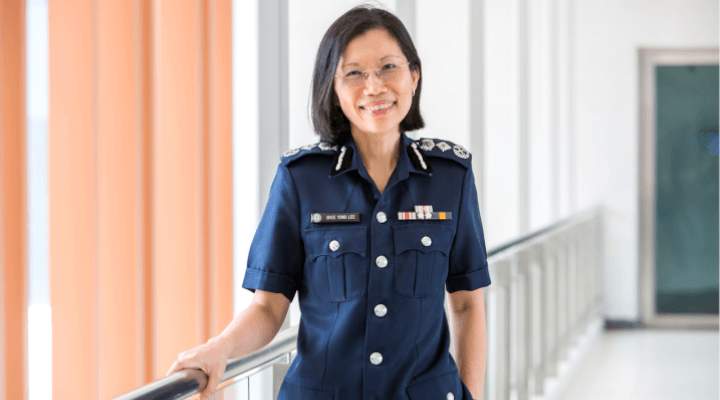“Be Yourself And Don’t Overcompensate”

Meeting Ms Shie Yong Lee in person defies expectations of how a prison commissioner might be like. Rather than fierce and commanding, the head of the Singapore Prison Service (SPS) comes across as warm, soft-spoken and one might even say mellow.
However, her approachability is far from a weakness. It's arguably one of her best strengths.
“Women officers like myself do have certain qualities that complement our male colleagues,” she says. “We are generally more sensitive, meticulous and nurturing. I think that’s a good thing as it provides balance within an organisation.”
When it comes to navigating a male-dominated environment, Ms Shie doesn’t see the need for adopting a more authoritative persona just to command respect. Respect is something that is earned through knowing and working with a person.
“I didn't have to prove myself to my male colleagues,” she says. “My advice to other woman officers is to be yourself and not overcompensate – either by being different or making harsher decisions − because of insecurities that you may be perceived as soft.” In the end, it would be the best man or woman for the job. Just be ready to serve when you are called upon.
Video by: Eric Lin
Being herself has worked out well for Ms Shie. She joined the SPS in 1995 as a Prison Officer, and steadily worked her way up with key appointments. These include heading operations at Changi Women’s Prison, as well as SPS’s Research and Planning Branch and Programme Branch.
She also served a stint at the Ministry of Home Affairs as Deputy Director (Civil Defence & Rehabilitation) at the Policy & Operations Division. She was Commander of a Cluster of five prisons before becoming SPS’s Deputy Commissioner in 2019. She was appointed as Commissioner of Prisons in September 2020.
Community Support for Rehabilitating Inmates
Presently, Ms Shie’s responsibilities involve leading the frontline commands in operations and driving long-term strategic planning and transformation of the Service. One key focus area in SPS’s transformation is community corrections, which shifts the focus from the rehabilitation of offenders in prison to supervising them safely in the community to better support reintegration and prevent re-offending.
As Ms Shie observes, about 1 in 4 offenders are serving the tail-end of their sentences in the community today. The number has increased over the last two years as the SPS has expanded its use of community corrections. She shares that many repeat offenders adjust quickly to the prison regimes.
However, they find it difficult to be good citizens and desist from crime or drugs when confronted with everyday challenges in society. Hence, the SPS in expanding community corrections to supervise and help released offenders overcome reintegration issues when in the community.
As the needs of the released offenders and their families are complex, the SPS is engaging community partners to also support the reintegration effort.
“For successful reintegration, our ex-offenders must be tapped into community resources that support them beyond the first few years of their release,” says Ms Shie.
Video by: Eric Lin
The most valuable strength of the SPS, other than its Captain of Lives vision, is its 4,000 strong pool of volunteers, whom Ms Shie describes as an “amazing group of people”. In fact, there are now more community volunteers than prison officers.
With a lean staff to inmate ratio of about 1:6 (other developed countries have ratios closer to 1:2), the SPS operates one of the most efficiently-run prison systems in the world – with two-year recidivism rates of 22%, among the world’s lowest. Ms Shie credits this success to SPS’s Captain of Lives, the use of technology in its operations and its community volunteers.
“Our committed volunteers have been our inspiration, and have given us so many new ideas to work on,” she says. “They want to do more and support both inmates and their families.”
For instance, some volunteers teach inmates life skills in prison. Others are part of the “Prison Gates” ministries, where they wait by the prison gates to welcome ex-offenders without supportive families on the day of their release. Upon an inmate's release, volunteers continue to journey with them and their families, supporting them in their reintegration journey.
The SPS is actively looking to grow this pool of in-prison care and aftercare volunteers. Even during the pandemic, they have taken active steps to continue to engage and train volunteers as well as show their appreciation through regular virtual dialogues and events, albeit via virtual means.
Caring for and Upskilling Staff
Besides supporting convicts and engaging volunteers, the wellbeing of staff is of paramount importance to Ms Shie. The main strength of the SPS is in the Captain of Lives vision, where the impact and actions of staff at the centre ripple outwards to the “inmates, their families, the community and the nation beyond”, says Ms Shie.
To help prison officers cope with the physical and mental fatigue, especially during the COVID-19 pandemic, SPS’s team came up with resource kits and webinars on mental resilience. Leaders also took special effort to show appreciation to their staff via different platforms.
Ms Shie also schedules both face-to-face and virtual dialogues with her officers. This is an avenue for her to listen to ground issues, help resolve their concerns and also show appreciation to staff.
Helping staff skill up is another priority. More officers are now trained in the people engagement aspect of correctional science.
“We have been coaching officers in restorative practices and skills so they can better motivate inmates,” says Ms Shie. “As part of our strategy to expand community corrections, we’re also upskilling officers to work with ex-offenders and their families when they leave prison.”
She adds that she’s extremely proud of her officers and what they have accomplished so far.
“They have been faithfully doing our work, often hidden from the public eye. I’m often inspired by their resilience, innovation and tenacity,” she says.
Looking After Self and Family
Chats with SPS staff who work closely with Ms Shie reveal a dedicated officer who never fails to show up at events that celebrate staff and volunteers, even beyond the usual work hours. She is also known for her sharp memory for names and faces, adding to the personal touch in her interactions.
Video by: Eric Lin
Though she’s got a lot on her plate, Ms Shie doesn't see herself as a workaholic. “I actually love to rest and fall into a very deep sleep when my head touches the pillow,” she says. While there may be work issues of concern, she advocates a good rest so that her thoughts are clearer to seek out the solution that is out there, together with her team.
She likens balancing her commitments to a juggling act with many balls in the air. Some balls are rubber and others glass.
“The glass balls are your health and family, and these need to be handled with extreme care,” she says. “Even as we work hard, we need to exercise self-care and look after our family.”
The mother of three tries to set aside time to do just that, though she admits it is “easier said than done”. Weekends are reserved for her family as far as possible. In trying to have more time for her children, she also makes an effort to send her children to school every day.
“I may not succeed in balancing work and family all the time, and there are both good and bad days,” Ms Shie admits. “But it starts with wanting to make it work.”

To get more stories like this, subscribe to the Challenge Telegram channel.
- POSTED ON
Jan 5, 2022
- TEXT BY
Rebecca Wong
- PHOTOS BY
Norman Ng









